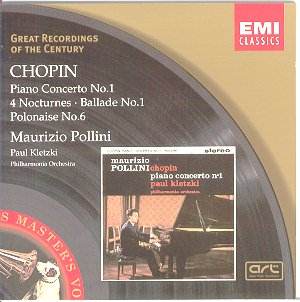Frederic CHOPIN (1810-49)
Piano Concerto No. 1 in E minor, Op. 11. Nocturnes - No. 4 in F, Op.
15 No. 1; No. 5 in F sharp, Op. 15 No. 2; Two Nocturnes, Op. 27. Ballade
No. 1 in G minor, Op. 23. Polonaise No. 6 in A flat, Op. 53.
 Maurizio Pollini (piano);
Philharmonia Orchestra/Paul Kletzki.
Maurizio Pollini (piano);
Philharmonia Orchestra/Paul Kletzki.
 EMI Great Recordings of
the Century CDM5 67548-2 [ADD]
[72'59]
EMI Great Recordings of
the Century CDM5 67548-2 [ADD]
[72'59]
Crotchet
AmazonUK
AmazonUS

Bringing together two classic HMV LPs made by a youthful Maurizio Pollini
makes for a winner of a disc. Pollini's marriage of youthful impetuosity,
technical perfection and an understanding of Chopin's world well beyond his
then-youthful years mean that this is a very special experience indeed. That
Kletzki raises the oft-maligned accompaniments in the concerto to equivalent
heights (no mere apologist here) acts as a bonus.
Throughout the performance of the concerto (recorded in April 1960), Pollini's
articulation is crystal clear and every chord is carefully judged. He reveals
a winning lyricism in the Romanze (something many people today find
lacking in his playing) and demonstrates a supreme grasp of the structure
of the outer movements. The recording is warm and supportive, capturing the
subtleties of both pianist and orchestra. The more one hears this performance,
the more one marvels at the levels of detailed preparation which went in
to it. This remains a reference recording of this work (why has he never
recorded the second concerto?) as well as an object lesson in piano playing.
Kletzki seems to comprehend Pollini's vision in its entirety and communicates
this exactly to his orchestra.
The remaining pieces made up a solo Chopin recital and were recorded in 1968.
The spontaneous vein of lyricism that so strongly marked the second movement
of the concerto resurfaces in the Nocturnes; the D flat, Op. 27 No. 2 is
particularly successful. Perhaps the quasi-impressionistic harmonic meanderings
of the final page of this piece in particular appealed to Pollini's sense
of fantasy. The G minor Ballade is close to Pollini's heart (he often uses
it as an encore). Here he manages to find the elusive balance between
articulating the various fast and slow sections, giving each their due
expression, and yet never letting the underlying tension sag. The explosive
coda is felt as a necessary release.
The performances on this disc should be returned to time and time again:
they are inexhaustible and deserve to remain in the catalogue forever.
Reviewer
Colin Clarke

